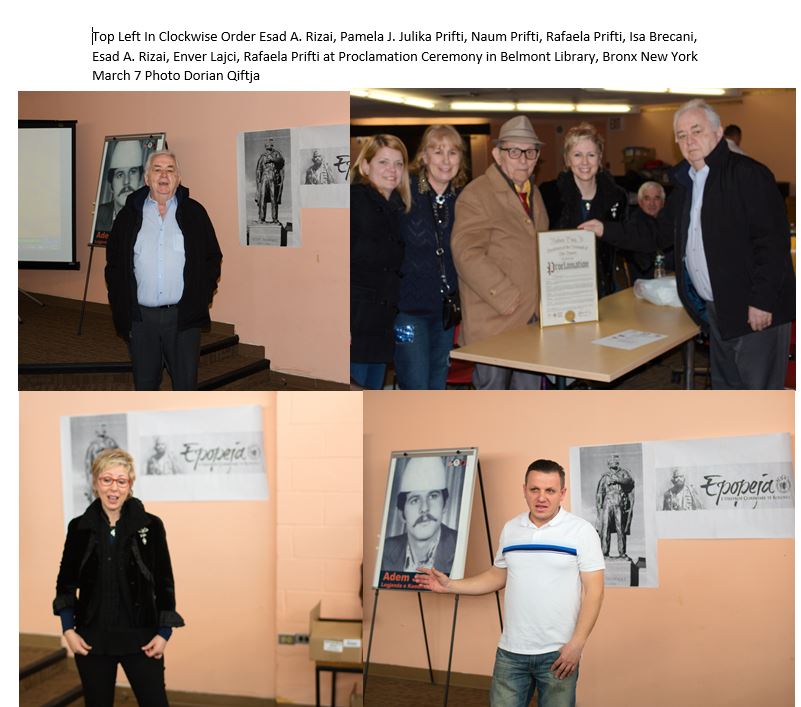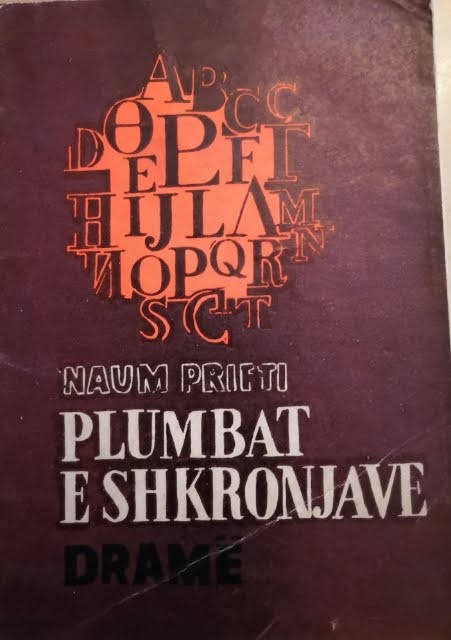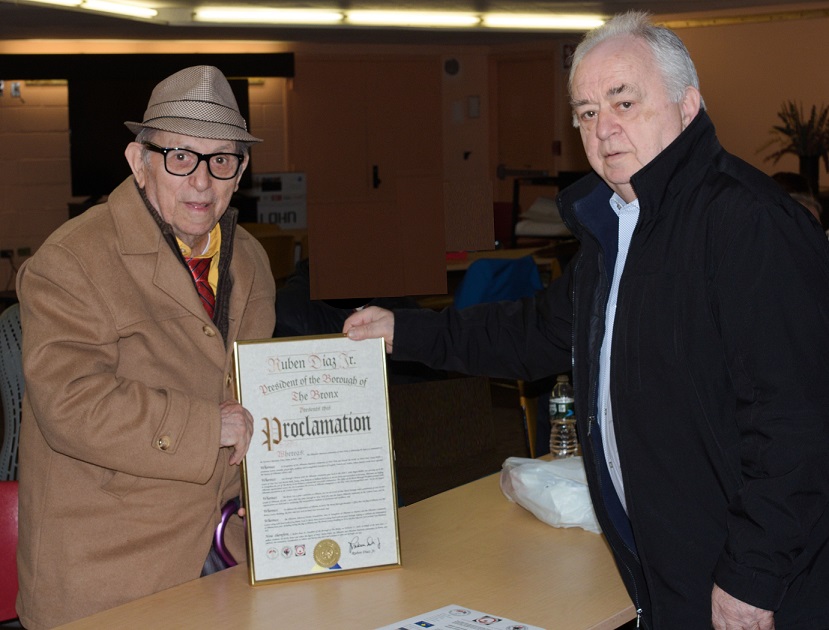For near two months, the days in the locked down city go by without much variation while questions of the collective revival spring up in our minds. Memories of the social past persist as the quarantine that has shaped our lives since last March is expected to be lifted in mid-May. Picking up our lives from the “pause” stemming from the pandemic may still take some mental practice and imagination. I remember two community events that were hosted on March 7 in the Bronx to commemorate teachers and honor heroes whose sacrifices laid the foundations of the Albanian nation. The concert was presented by Alba Life School and the afternoon ceremony was hosted by the American Albanian Society Foundation. I spoke to these community activists to get their current perspective and share some of the memories.
MARCH 7 AT THE BRONX ADDITION OF ALBA LIFE SCHOOL
On school year weekends, the students of Alba Life, sit in classes across New York boroughs to engage in learning their mother tongue. The creators of the school, Kozeta and Qemal Zylo, are aware that diffusing the knowledge of the family language to the young generation born here is to the advantage of all Albanian people. The ones who carry out this honorable task are teachers at Alba Life that first opened its classes in the early 2000s. To appreciate the educators, in the tradition of the motherland, over 100 school students ranging from toddlers to teens, performed in front of their families and guests on March 7 at the Christopher Columbus High School. The date commemorates the opening of the first Albanian language school in the home-country in 1887. The venue represents the new Bronx addition of the Alba Life School operating now in all New York boroughs.
The performance brought all the students on the auditorium stage where each group that was called stepped forward to recite, sing or dance. It was a touching display of an enormous commitment by the school’s faculty who had built a program that showcased each child’s skills and level of proficiency. The presenter, Ms. Rea Ulaj, who is also a Board Member of the School, introduced fluidly each class with the corresponding teacher and each student performer. Dressed in red and black, the American-Albanian children of the 21 century generation, recited immortal poems written by Albanian poets of 19th century like Naim Frasheri, Andon Zako Cajupi, and modern day authors like Odhise Grillo, Adelina Mamaqi, Ali Podrimja and more. And the audience was overcome with emotions. Guests like Mr. Mark Qehaja, Chairman of Albanian-American Skenderbeg Association, Mr. Lulzim Krasniqi, Counselor at Kosova’s New York General Consulate, praised teachers as the unsung heroes who motivate students throughout their lives. Mr. Mehill Velaj, Chairman of the Albanian-American Writers Association, shared bittersweet memories from the time he was forced to abandon his students and his profession from the threat of persecution by the Serbian regime. Dr. Manjola Duli, who introduced herself, spoke with heartfelt admiration for her beloved high school teacher Mrs. Kozeta Zylo. They both recounted the bleak experience of Albania’s civil unrest in 1997, that “forced me and the family to immigrate to the US”, said Mrs. Zylo. After more than twenty years, teacher and student were reunited in what was a very touching and befitting moment at the performance. The poems dedicated to ‘the divine language’, the alphabet, the teachers who have been in the front line of the Albanian national movement for independence, motherland and so on echoed poignantly at this time of troubling news from the home country. Whether timid or confident on stage, each student assisted by their instructors delivered their lines, carried the tunes and danced in a performance that lasted over two hours. Their voices grew stronger and rose up as the celebrated Albanian singer and Vatra member, Ms. Valbona Peraj encouraged them to join her in singing her hit songs – Jam Arberore, Kuq e Zi. Speaking in Albanian and then English. New York Councilman Mark Gjonaj, said that he was honored to be invited and be included in Alba Life’s programs. Mr. Mark Gjonaj awarded each teacher with a Letter of Citation in recognition of their valuable work for the community.
My personal connection with the school began when the directors, Qemal and Kozeta Zylo, invited my father, Naum R. Prifti at the Brooklyn classes on March 7, about ten years ago. He is a writer who also taught for a number of years in Albania. Since his birthday happens to be on the same day as Teacher’s Day, Alba Life celebrated both jointly. Last June, during the Albanian week that culminated with the midtown parade led by Albanian Roots, I covered the open classes dedicated to Chameria at the Staten Island affiliate of Alba Life. Students presented proudly the posters they had prepared with thoughtfulness and diligence. The performance of March 7, 2020 was an opportunity to see all the students and faculty of Alba Life from all boroughs. I got inspired to ask the students to write a short description of their performance experience. Much like the school and the teachers, I also aim to cultivate the love for our language by following the footsteps of the founders of Dielli. For it is to the advantage of all Albanian people to know both – the first language and mother tongue – equally well.
Two months have passed now and Kozeta Zylo, writer and co-founder of Alba Life School, says that it is very hard not to visit with the grandchildren as she follows the stay-at-home guidelines. “I truly miss our students,” Mrs. Zylo confides, recalling their March 7th concert earlier this year “and the sweet sounds of their voices.” As far as work with Alba Life TV, she conducts interviews via Internet with public health professionals and medical experts around the world to thank them for their service. Her career and life partner, Qemal Zylo, Director and Founder of Alba Life TV and School, reveals that the current isolation in America and around the globe feels unreal. “The highest toll of quarantine weeks has been the inability to get together with our children and grandchildren,” says he, “and not seeing the students, staff and parents.” The domestic routine contrasts sharply with the couple’s very active and dynamic lifestyle before the crises. “We were used to being constantly on the move,” explains Mr. Zylo, “running to community events with the camera equipment or carrying books to and from school. I miss it so much.” Yet they have adapted to the new reality and have moved to broadcast online. The Alba Life TV director mentions that they are bringing to the audience “Albanian greetings from the quarantine” and a special children’s program on Saturdays geared towards education.

MARCH 7 AT THE ALBANIAN AMERICAN SOCIETY FOUNDATION CEREMONY
Mr. Esad A. Rizai, President of the Albanian American Society Foundation, recalls his opening remarks from the March 7 Proclamation ceremony at the Belmont Library: “Acknowledging and honoring those who have placed the nation’s interest above all else has brought us together today.” Mr. Rizai, who hosted the event, notes that the day itself carried symbolism and significance. Kosovo’s legendary hero and freedom fighter Adem Jashari, was slayed with some fifty members of his large family by the Serbian police forces in Prekaz on March 7, 1998. The prolific writer, novelist and satirist whose career spans for six decades Naum Prifti was born on March 7, 1932. The office of the Bronx Borough President Ruben Diaz Junior had issued a post-mortem citation to Adem Jashari and a Proclamation to honor the lifework of Naum Prifti. The Founder and President of the Albanian American Society Foundation, Mr. Esad A. Rizai, speaks with reverence about the impact of the “pen and the sword” that best personify two honorees, Adem Jashari and Naum Prifti. He remembers the special guests, community representative and family members at the event: Mr. Hajdin Alijaj, Mr. Avni Karakushi, Mr. and Mrs. Enver and Kade Lajqi from the American Albanian Society Foundation, Ricci Campbell, American actor. In his remarks, Albanian poet and songwriter Isa Brecani highlighted moments of Adem Jashari’s life that has impacted generations of Albanians. With reference to Jashari’s heroic acts, Mr. Rizai says “History has shown that even one person can make a difference,” through the strength of their power or the might of the pen. Julika Prifti, the writer’s second daughter, noted that despite the years, his purity, gentleness and unique humanity are the signature traits of Naum Prifti as a person and a writer. The professional writer, continued his publicist career after moving to America, and also carried out the duties of Secretary of Vatra for over a decade. Imbued with the ideals of the older generation of Albanians and spirit of patriotism, “these men have made us proud as Albanians living in America”, said Mr. Rizai. In part, the Proclamation by President Ruben Diaz Junior of the Bronx representing more than 1.4 million residents stated “In recognition of the Albanian-American community of New York and around the world, we honor Naum Prifti, a prominent writer, playwright, publicist and accomplished translator of English, French and Italian whose timeless works have captured the beauty of the Albanian culture.” Accepting the honor, Naum Prifti said with a chuckle that although he did not choose to be born on March 7th, he did start writing at a very young age, and grew increasingly aware of the exceptional burden that a writer carries. “In the years of the “cultural revolution’ of Albania’s tight communist grip, I was sent to teach in the Divjake region to be ‘reeducated’ after having written a play that was deemed to be ‘ideologically faulty’ by the political standards of the regime.” He remarked that teachers, just like writers and artists are bound by a similar mission because the success of a writer is not measured by the literary awards but rather by the readers’ love and affection for the body of work he has created. “In this sense, the writer is a public persona or a personality with a social status that goes beyond the circle of family and friends into the generations who, have come to know the works of the writer, and have allowed themselves to be entertained as well as educated by them. We are only as good as the humanism we have inspired onto others because art is not its own purpose,” said Naum Prifti.
While the New York governor laid out the terms for a phased reopening to start in over a week, it is refreshing to visit the pre-pandemic memories to revive our social past if only in our minds.
CONVERSING WITH MY FATHER

Along the struggles for freedom, throughout our history, Albanian educators and patriots have embodied the power of the word. To explore further the origins of the term “the pen is mightier than the sword” my father and I looked into the records. Comparisons between words and weapons go back in the Greek civilization, yet the first recorded expression is documented in the historical play Cardinal Richelieu written by English writer and politician Edward Buwle-Lytton. The Chief Minister to King Louis XIII, Richelieu was believed to have discovered a plot to kill him, but as a priest he was unable to take up arms against the enemies. When one of the characters points out: “But now, at your command are other weapons, my good Lord.” Richelieu agrees, by stating: “The pen is mightier than the sword… Take away the sword; States can be saved without it!” The expression quickly gained currency, according to the Oxford Quotations Dictionaries and by the mid nineteenth century “it was commonplace.” Still in 17th century publications and even earlier, variations of the phrase make appearance in print to convey a popular saying of the time “A blow with a word strikes deeper than a blow with a sword”. Going all the way back to the Greek civilizations, Euripides, the poet who died about 406 BC, is credited with writing: “The tongue is mightier than the blade.” In classical times there was a belief that the written word possessed the power to survive “and transcend even the bloodiest events… even if they didn’t actually prevail against arms in the short term.” In the present times, an adequate illustration of the word and weapon comparison is Napoleon Bonaparte. “Four hostile newspapers are more to be feared than 1,000 bayonets,” he is quoted as saying in some official accounts. After Napoleon seized power and proceeded to influence politics of 19th century Europe, he suppressed most of the newspapers in France and sanctioned only a handful of publications. Scholars agree that he respected the press and feared it too. The military mind of the General who crowned himself Emperor of the French realized that the pen, in his own hand could be a weapon, with which he could undermine the allies who had defeated him. He did just that by writing his own memoirs and transforming himself from a bloody minded despot who buried the French Revolution into a fair-minded constitutionalist who saved the Revolution and liberated Europe. On Balzac’s desk sat a bust of the emperor, the base emblazoned with the words “All that he did with a sword, I will accomplish with a pen.”
Then our memories arch back to my father’s play Plumbat e Shkronjave (Might of the Pen), which two professional theaters made into a production in Albania in May 1978. The inspiration for writing the play came from Professor Skender Luarasi, who first had shared with Naum Prifti the story of the teacher Gjerasim Qiriazi kidnaped by rebel Shahin Matraku. To lure the bandit to take action, the Greek Patrichana had pushed false information that a wealthy gentleman was passing by. In reality, the teacher was on his way to open an all girls’ school in Korca. The Albanian patriots intervened to free Gjerasim Qiriazi who along with his sisters taught at Korca School for girls. Inspired by the true events, my father wrote the play which I still remember for its powerful characters, dialogue and a remarkable twist.
The tribute to the events of two months prior still bring us closer and make us hopeful for our collective future.

Pershendetje Poete Elida Bucpapaj , Nder e respekt per ju te vazhdueshem !
Pershendetje Poete Elida Bucpapaj , Nder e respekt per ju te vazhdueshem !